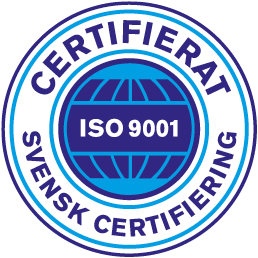HKScan and Roima – future-proofing through standardization and digital transformation
HKScan, a leader in the food industry known for brands such as Scan, Pärsons, and Bullens Pilsnerkorv, needed to modernize the IT infrastructure at its plant in Linköping, Sweden. The factory is a central part of the company’s operations, ranging from slaughtering, meat cutting, and sausage production, with the well-known falukorven as its main product. HKScan was struggling with a system that had worked well for many years but was outdated and no longer met today’s requirements for flexibility and scalability to ensure efficient and sustainable production.
After carefully evaluating possible partners, HKScan finally chose Roima, motivated by previous successes with AVEVA’s platform in Finland, their expertise in the food and meat industry, and their local presence close to HKScan’s facility in Linköping, Sweden. The core of the project was to implement a standardized MES and SCADA solution based on the AVEVA platform. This was chosen for its well-integrated and standardized SCADA and MES functionality that will support HKSca’s current and future production processes and enable expanded use of digitalized ways of working.
In March 2024, HKScan underwent significant organizational changes. The company sold its Swedish operations, including the facility in Linköping, Sweden, to Lantmännen. This part of the business is now known as Scan Sverige AB. At the same time, a name change from HKScan to HKFoods took place. This text refers to the activities and processes carried out during the time the company operated as HKScan in Sweden, specifically at the Linköping plant, which is now part of Scan Sverige AB.
Roima’s experience in the meat industry and their physical proximity to our factory in Linköping, Sweden, made them an ideal partner.
Oskar Axelsson, Production Manager, HKScan
Modernization in focus
HKScan, which has deep roots in the Nordic food industry and has long been a pioneer in sustainable and quality-conscious production, faced the critical challenge of modernizing its IT infrastructure at the Linköping plant. The plant, famous for its production of the iconic falukorven sausage, among other things, had a customized production system that supported the production very well for many years. However, they now faced a situation where the system could no longer be scaled or upgraded, and new conditions in production presented requirements that could not be supported.
“Our previous system was reliable but aging. The risk of production downtime was a constant concern that could have far-reaching consequences,” explains Jens Kleist, IT Project Manager at HKScan.
Roima's expertise and local presence
HKScan’s choice of Roima as a partner was crucial to the success of the project. Thanks to Roima’s experience from similar projects with HKScan in Finland and their deep understanding of the specific needs of the food industry, they were able to offer a perfect combination of technical expertise and local presence. Their unique qualities as a supplier to HKScan included:
- Specialized experience: A deep understanding of the challenges of the food and meat industry, which was crucial in offering tailored solutions.
- Technical expertise: Previous successes in implementing AVEVA solutions contributed to a deeper understanding of meeting HKScan’s specific needs.
- Geographical proximity: Roima’s office was just a stone's throw away from HKScan’s facility, facilitating quick communication and face-to-face meetings.
“Roima’s experience in the meat industry and their physical proximity to our factory in Linköping made them an ideal partner,” adds Oskar Axelsson, Production Manager at HKScan.
Technical challenges
A crucial challenge was to implement the new AVEVA platform with minimal disruption to the existing production environment, especially in the production control logic. These systems required fine-tuning to ensure the new technology integrated smoothly and improved the existing production processes.
“We needed a solution that could integrate seamlessly with our existing equipment, with minimal impact on our daily operations,” says Oskar. Roima’s solution involved carefully balancing the need for technological innovation with an understanding of HKScan’s operational reality.
The implementation of the AVEVA platform enabled a range of improvements, including the automation of processes that previously required manual intervention and improved data management through integration with the company’s ERP system. “The integration with ERP has been seamless, improving our ability to report and adjust production quickly and accurately,” explains Jens Kleist.
Go-live and future-proof results
The go-live of the new platform was scheduled for October 2023, a date carefully chosen to minimize the impact on production. “The first days were challenging, but thanks to the Roima consultants on-site, we were able to stabilize production quickly,” says Joacim Andersson, one of the operators and a SuperUser in the project. Joakim continues that Roima’s commitment on site was crucial to ensure a smooth transition and that no customer was left without delivery during this critical period.
“Having Roima’s team physically present at the start-up ensured that we could handle any immediate challenges and give our operators the support they needed,” explains Oskar Axelsson. This strategy enabled HKScan to achieve a stable operation quickly and maintain its service and delivery to its customers without interruption.
A stable supply of falukorv for Swedish families
With its rich history and place in the Swedish heart, falukorven is more than just a food product; it is part of Swedish culture and a symbol of home-cooked, convenient food. Many families need quick, nutritious, and popular meals. Ensuring the availability of this beloved product was, therefore, not only a matter of logistics and production efficiency but also of maintaining a certain quality of life for Swedish families.
“Swedish families were able to buy falukorv, and no grocers were left without supply,” Jens adds about the smooth start-up of production on the new AVEVA platform.
Roima’s way of working
The project with HKScan successfully illustrated Roima’s approach to digital transformation in industrial production. By combining industrial best practices, methods, and models, especially from ISA-95 and MESA, Roima optimized and streamlined the production processes with systematic analysis to identify and implement the most appropriate solutions. A critical aspect of Roima’s approach was to understand and develop HKScan’s workflows to increase productivity and reduce dependence on manual labor.
This customer-centric approach was crucial to the project's success. By mapping the company's functional areas, Roima identified how different processes and departments could interact more efficiently, improving information flow and reducing bottlenecks.
Roima's methodology for digital transformation in industrial production
Roima’s approach to the HKScan project demonstrates a methodology that combines industrial best practices and models, particularly from ISA-95 and MESA, to optimize and streamline production processes. Roima’s work is characterized by a systematic analysis and assessment to identify and implement the most appropriate solutions. Here are some key aspects of Roima’s approach:
- Analyze and determine maturity: Roima starts the process by assessing the company’s level of maturity in relation to digitalization and automation. This involves an in-depth review of the existing technical infrastructure, software solutions, and production processes to understand where the company stands today and identify areas for improvement.
- Working practices: Another important part of our approach is analyzing and understanding the company’s working practices. These range from daily routines to more complex processes that control production. The aim is to identify efficiencies and opportunities to standardize and automate workflows to increase productivity and reduce manual work.
- Functional area mapping: Roima maps the functional areas within the organization to get an overview of how different departments and processes interact. This helps identify bottlenecks and potential for integration between systems and departments, which can lead to smoother processes and better information flow.
- Information sharing and ownership mapping: A key part of Roima’s methodology is to map information sharing and establish ownership of data and processes. This means carefully analyzing how the company collects, stores, shares, and uses information. Creating clear lines of information ownership and responsibility ensures that the right information is available to the right people at the right time, facilitating decision-making and optimizing operational performance.
By applying these principles and methods, Roima was able to offer HKScan a solution that not only met its technical and operational needs but also prepared the company for future growth and innovation. Roima’s approach demonstrates the importance of a holistic approach to production optimization, where technology, processes, and people work together to create a more efficient and sustainable production environment.
The results
Through the implementation of the new AVEVA platform, HKScan achieved:
- A standardized and future-proof IT platform.
- A platform ready to be extended with new functionality and new production sections.
- No downtime at start-up, avoiding loss of production.
- Increased reliability and reduced risk of production downtime.
- Improved IT security and centralized hardware management.
- Increased flexibility in production, with faster changeover times.
- Increased visibility and control over production through instant feedback to the ERP system.
Future possibilities and continuous development
Through this project, HKScan has laid a solid foundation for continued innovation and streamlining of its operational processes. Implementing the new AVEVA platform has opened the door for further automation and integration across the company’s production processes, with the aim of improving efficiency and sustainability in production.
“This is just the beginning. We look forward to continuing our journey towards a more digitalized and sustainable future,” concludes Jens Kleist.
Conclusion
The collaboration between HKScan and Roima powerfully illustrates how strategically chosen partnerships and technological solutions can transform production processes, ensure continuity for customers, and strengthen a company’s position in the market. By focusing on both the technical and operational aspects of the project and by ensuring the presence of expert consultants at critical moments, HKScan has not only overcome the challenges of an outdated infrastructure but also paved the way for future innovations.
-
Roima Intelligence the premier AVEVA Endorsed System
Roima Intelligence: AVEVA Endorsed System Integrator in Sweden and Finland














